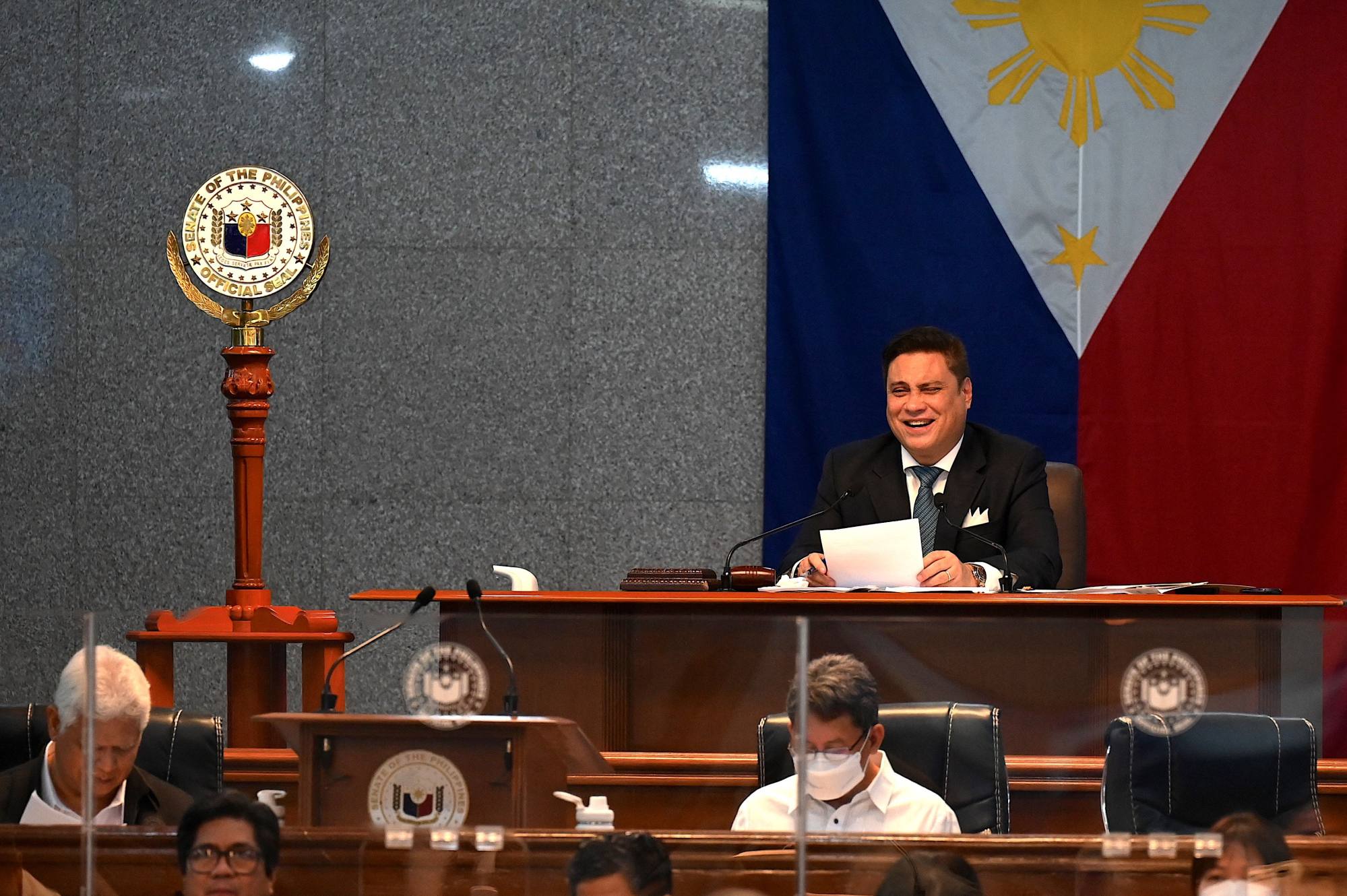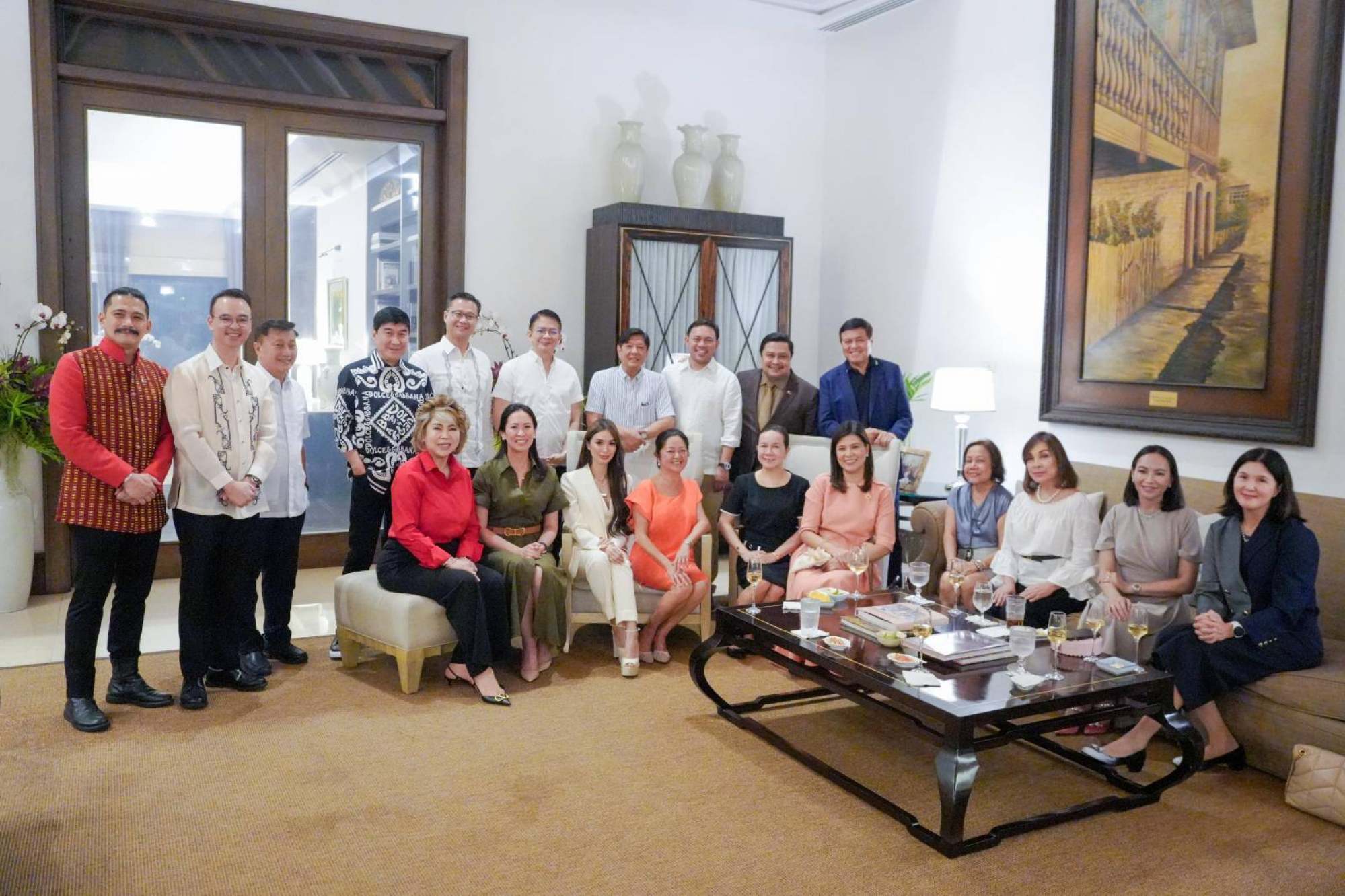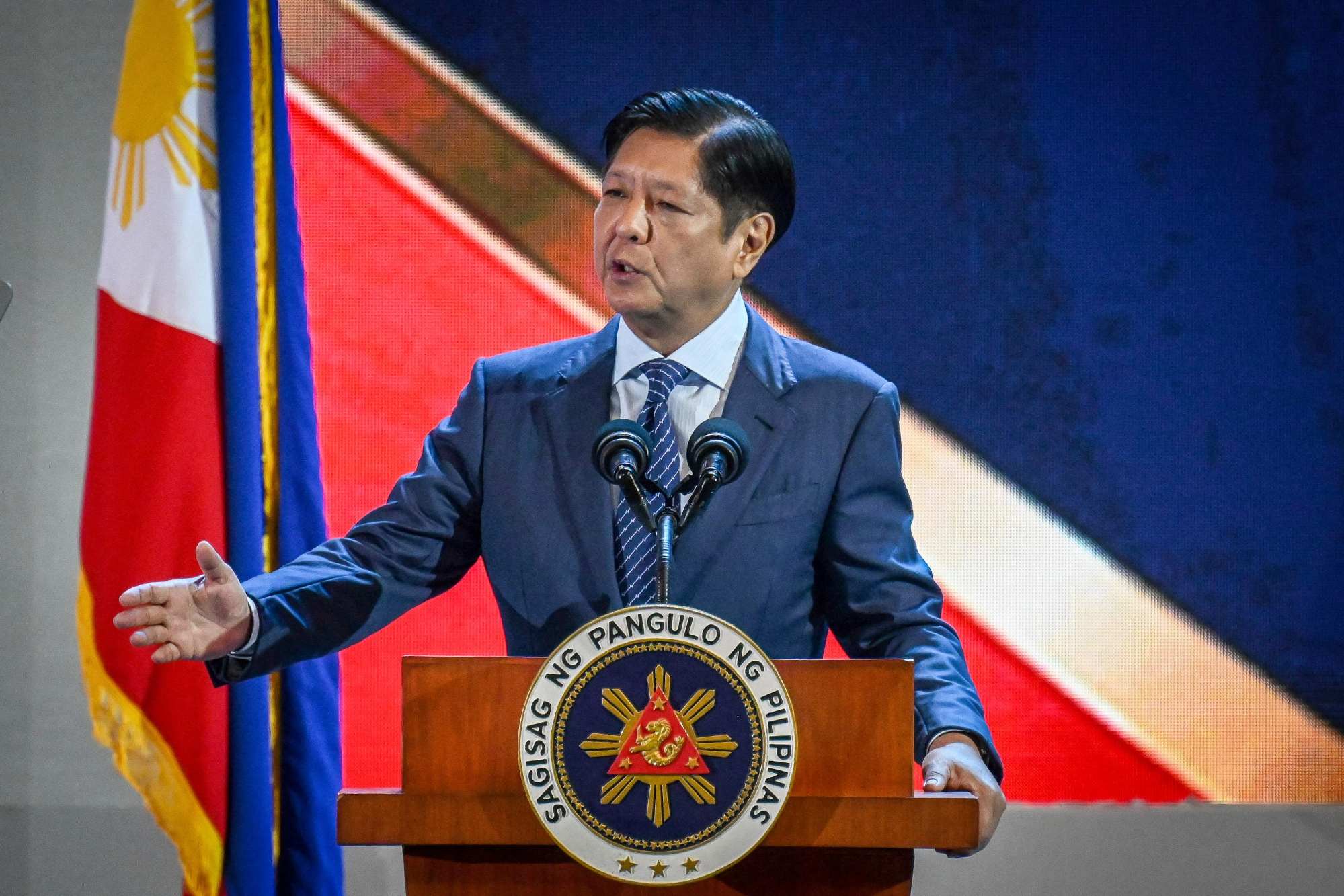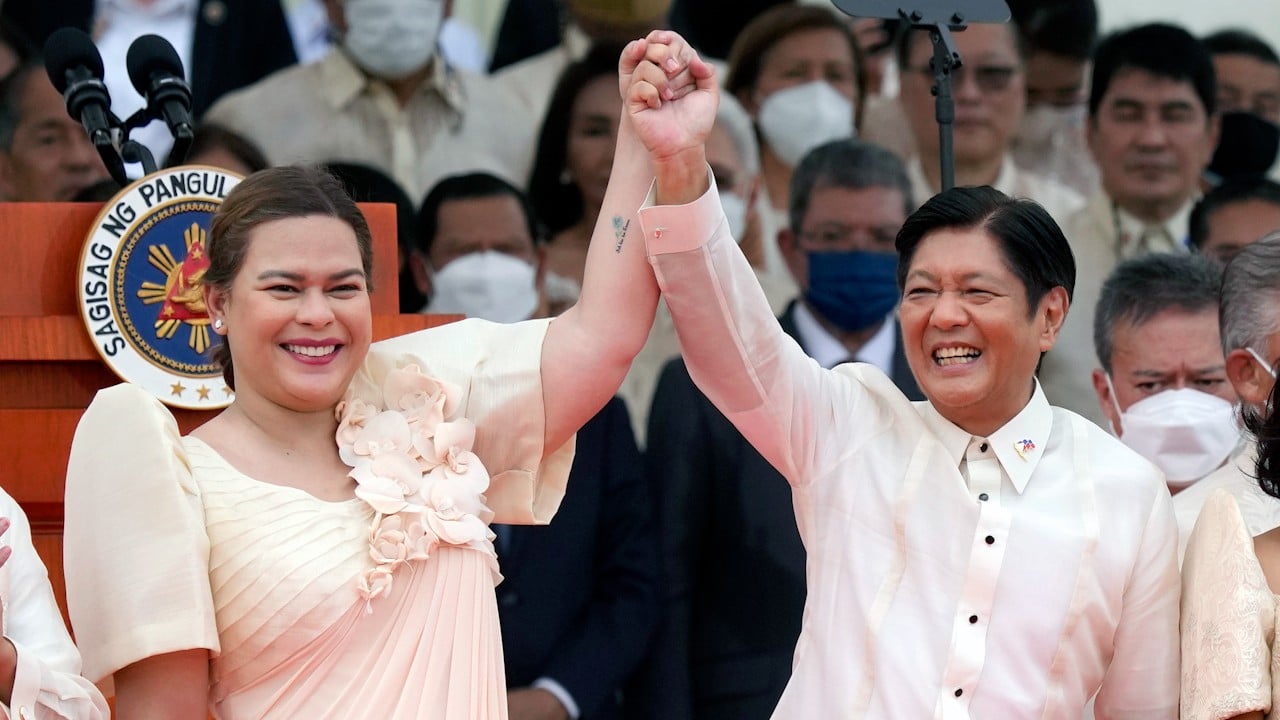
Philippines’ Marcos Jnr forges alliances, hands out cash aid as he gears up for midterm elections
- The president’s efforts at consolidating political forces are meant to project unity and bolster his influence amid uncertain loyalties of allies, analysts say
- Despite a recent show of solidarity with the new senate chief, Marcos Jnr’s rocky alliance with the Dutertes could cast a pall on his ambitions
On May 8, as the Philippine armed forces made history by firing their first ever acquired anti-ship cruise missile during high-profile war games, the country’s top official was noticeably absent inside the military command centre.
Instead, Marcos Jnr was preoccupied with forging a major political alliance, marking the start of his efforts to consolidate political forces and secure a victory for his party in next year’s midterm elections.
Those efforts have included the creation of several strategic partnerships and other manoeuvres analysts say are meant to project unity and bolster his influence while the loyalty of his allies remains uncertain.

PFP has 13 members in the House and none in the senate but claims to have 43 per cent of all governors as members.
On May 18, Marcos Jnr’s PFP signed another alliance with the Nationalist People’s Coalition (NPC) chaired by former senate president Vicente Sotto III.
The president had signalled on May 2 that he was open to forging an alliance with the Nacionalista Party, controlled by the Villar family which Forbes magazine listed earlier this year as the second-richest in the country.
In between, the president criss-crossed the southern island of Mindanao to personally hand out over 10,000 pesos each in cash aid to select farmers, fishermen and poor families hit hard by the drought caused by El Niño, for a total of 478.8 million pesos (US$8.2 million).
His personal dole-outs were eagerly received and several hundreds crammed the events despite tight security.

Monday saw the most palpable demonstration of Marcos Jnr’s influence as he orchestrated the ousting of senate President Juan Miguel Zubiri, primarily by senators who had gained their seats with the president’s backing.
A “heartbroken” Zubiri attributed his ousting to his refusal to halt an investigation into the president’s alleged illegal drug use by Senator Ronald “Bato” Dela Rosa, Duterte’s former national police chief, and his earlier refusal to support a move to amend the Philippine constitution to allow Marcos Jnr to extend his term in office.
“We did not agree on their timeline on the charter change, that’s also where I felt they were a little resentful and it was difficult because I just want the independence of the senate to remain,” Zubiri said.
Zubiri had been a key architect of Marcos Jnr’s landslide victory in his home province of Bukidnon in Mindanao during the 2022 race, where Marcos Jnr won 72 per cent of the total number of Bukidnon votes.
The presidential palace denied any foreknowledge or hand in Zubiri’s ouster, but a victory dinner held the next day and hosted by Marcos Jnr and his wife Marie Louise “Liza” Araneta-Marcos in the presidential palace showed 12 senators and most of their spouses smiling together.

Araneta-Marcos, who had served as her husband’s election campaign manager, posted a photo of the event on Facebook, captioned “Casual dinner with Senators and their spouses”.
Seated beside her was international celebrity-model and influencer-actress Heart Evangelista, wife of the newly installed senate President Francis “Chiz” Escudero, who stood beside Marcos Jnr. Escudero is a member of the NPC.
Political risk analyst Ronald Llamas told This Week in Asia the photo was an attempt to project a united front between the presidential palace and the senate.
However, he noted, “from my vantage point, I can’t see anyone in the senate who is solidly for [Marcos Jnr].”
After Escudero won, the president praised him publicly on social media and said he was “extending my support to the new Senate President”.
However, Llamas said Escudero had supported Marcos Jnr’s rival, then vice-president Leni Robredo, in the 2022 election and had his own views on issues such as changing the 1987 constitution to lift term limits on all elective posts including the presidency.
Escudero had in 2014 publicly said he was against removing the constitutional provision limiting a sitting president to a single term of six years. On Monday,, he said he was open to discussing constitutional changes but added “I have no reason to change my position”.

More than 17,000 local and national posts are at stake in the midterm elections, which will be held on May 12 next year. But Llamas said the president had to focus on securing the 12 posts in the 24-member senate to “pass his priority bills and pursue his projects”, as well as stop investigations that undermined his agenda.
Llamas, however, pointed out the peculiarity of the Philippine political system where “the focus is [on the candidate’s] personality, not parties”. In other words, persons are elected to high office not because of their public service record, expertise or their party affiliation, but because of the force of their charisma and personality.
As former senate president Sotto III told This Week in Asia on Thursday, “Strong candidates are coming from all over and not from any single group.” He noted that both Senator Raffy Tulfo – who had run as an independent for the 2022 senate – and Vice-President Duterte-Carpio were statistically tied at the top of the latest Pulse Asia survey, released in April, on the 2028 presidential race.
When asked if Marcos Jnr’s alliance-building constituted a formidable coalition for next year’s polls, Sotto clarified that the president was forming an “alliance, not a coalition”, allowing parties involved to retain autonomy while strengthening the “Equity of the Incumbent policy” at the local level.
The so-called Equity of the Incumbent, according to lawmakers, means that whoever is in office has the added advantage of using government funds to push for his or someone else’s re-election under the guise of government aid or projects in areas where the person in power is politically weak.
In the case of Marcos Jnr, although he is not running for office, he can use the national budget for his favoured candidates to win votes from their rivals.
Sotto was originally a popular comedian and TV host before turning to politics and eventually serving four terms in the senate. He said the president – in order to win – would have to ensure that the national budget “should be put to good use and stream down to the people and not the pork barrels [politicians’ pockets]”.
A notable political development that has cast a pall on Marcos Jnr’s political ambitions is his falling out with Duterte-Carpio, with whom he had forged the winning “Uniteam” ticket in 2022. In place of the “Uniteam” for next year’s midterms, he is betting his political fortunes on his Alliance for a New Philippines, starting with the Lakas-CMD and then the NPC.
The latest Pulse Asia survey on the 2025 midterm polls, released in April, showed former president Duterte in third, although his camp has not announced any particular candidate.
Duterte has so far not revealed his political intentions. In 2022, he formally filed to run for the senate but unexpectedly withdrew.
Llamas cautioned that, given the lack of ideological or platform-based commitments among political party candidates, Marcos Jnr could find himself backing senatorial candidates who might later turn against him.
“Their loyalties are never certain,” he said.


